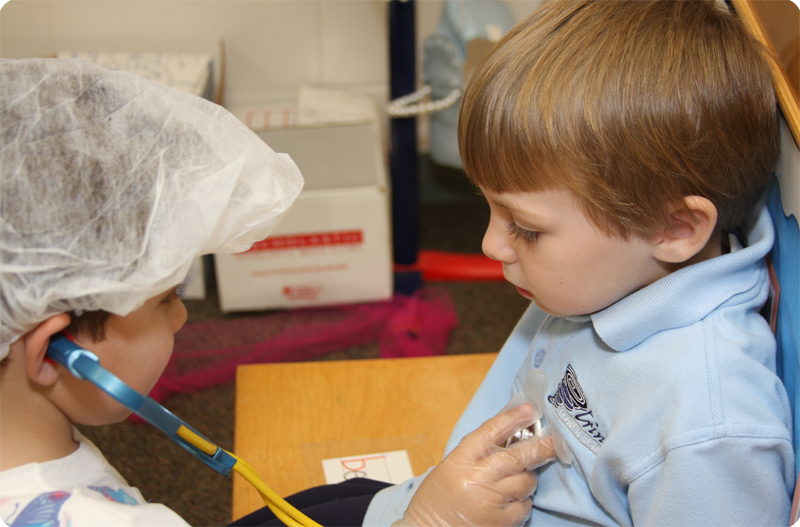Heartbeat of Trinity
The Heartbeat of Trinity's Curriculum
Lucy Sprague Mitchell believed that part of making experiences educative was providing a rich but unified context for learning and that the ideal context was a geographical study. For Mitchell, it was within the study of geography that all the arts and sciences met. She felt that learning math, literature, and science could be accomplished more effectively by linking them to an active study, say of a neighborhood or of South America than by reading and memorizing facts and statistics from a textbook.
At Trinity, we continue to dedicate ourselves to the creation of a learning environment that provides children with rich and varied opportunities to study the human world and that, as such, provides a context for making meaning out of human knowledge and experience. While geography is still an essential part of all our studies, we have broadened our social studies to include cultural anthropology, history, political science, and economics. These five "social studies",¬ù in conjunction with the arts and sciences, are the core of the social studies curricula in our classrooms.
When looking at the social studies program from the youngest to the oldest children, the following themes recur with increasing complexity:
- People and their physical environment
- Community, from the family to the world
- Continuity, that is communication from generation to generation through which we build upon the past and transform the future
- Meaning through myth, religion, science, and art
- Values in the systems people develop to structure individual and group behavior
- Change as a basic fact of life
- How people solve problems and handle conflicts
Social Studies and the Learning Environment
An important part of our social studies basis at Trinity is referred to as implicit social studies- the life of the classroom itself. How we organize and manage the school and classrooms sends a powerful message to the students about values and community. The children bring to school a wide array of experiences and knowledge that becomes a part of this spontaneous, implicit curriculum. We strive as a school to see in our own organization and in the issues and ideas children bring to us, opportunities for future social studies teaching and learning. Our classrooms are working and living representations of the scientist's laboratory and the artist's studio. From their observations, experiences, and research, children collect and record scientific data. They make and discuss hypotheses that will be subjected to further testing and analyses. As children work with the sensorial materials of art, they can image and project themselves into the time and space of the culture being studied. They are integrating and accommodating their own personal feelings and ideas with those experienced in the "here and now" of families and friends, and from the "far away and long ago"¬ù such as present day Africa, India, China, or of ancient Mexico and Egypt.
Our classrooms are working and living representations of the scientist's laboratory and the artist's studio. From their observations, experiences, and research, children collect and record scientific data. They make and discuss hypotheses that will be subjected to further testing and analyses. As children work with the sensorial materials of art, they can image and project themselves into the time and space of the culture being studied. They are integrating and accommodating their own personal feelings and ideas with those experienced in the "here and now" of families and friends, and from the "far away and long ago"¬ù such as present day Africa, India, China, or of ancient Mexico and Egypt.
Integration of Curriculum
Not all learning at Trinity is intellectually linked to all other learning. As children grow intellectually and become reliant on thoughts and words and less bound to the evidence of their own senses, the possible directions learning can take grow enormously. No single topic can provide enough rich and varied opportunities in all the disciplines, and it would be a contrivance to force connections where none exist. Each teacher uses his own expertise to provide basic skills and understanding in his discipline. At the same time, each teacher takes into consideration what students are studying, as well as the developmental tasks and needs of the group. Throughout the grades, skills and concepts are learning that are not tied by design to a core study.
The Social Studies program at Trinity seeks to provide students with the skills and knowledge that will enable them to:
- Find answers to their questions
- Be curious, involved learners
- Understand and relate to the multicultural nature of their city, county, and world
- Function effectively as individuals, community members, and as citizens
- Understand themselves and others
- Improve the quality of their own lives and the lives of others
- Participate constructively in solving problems and conflicts

